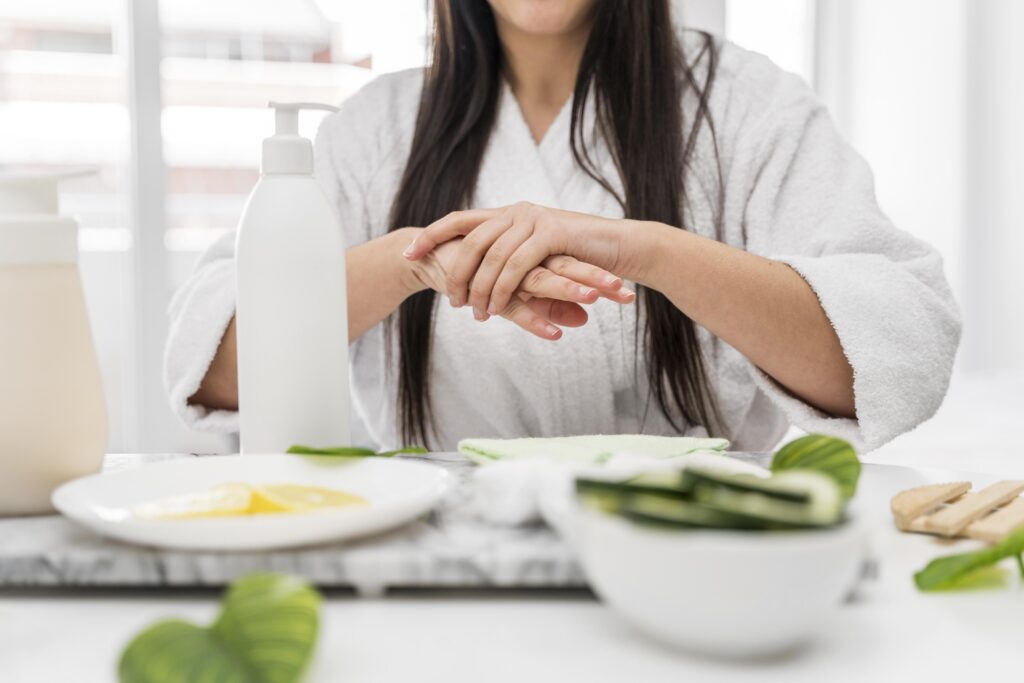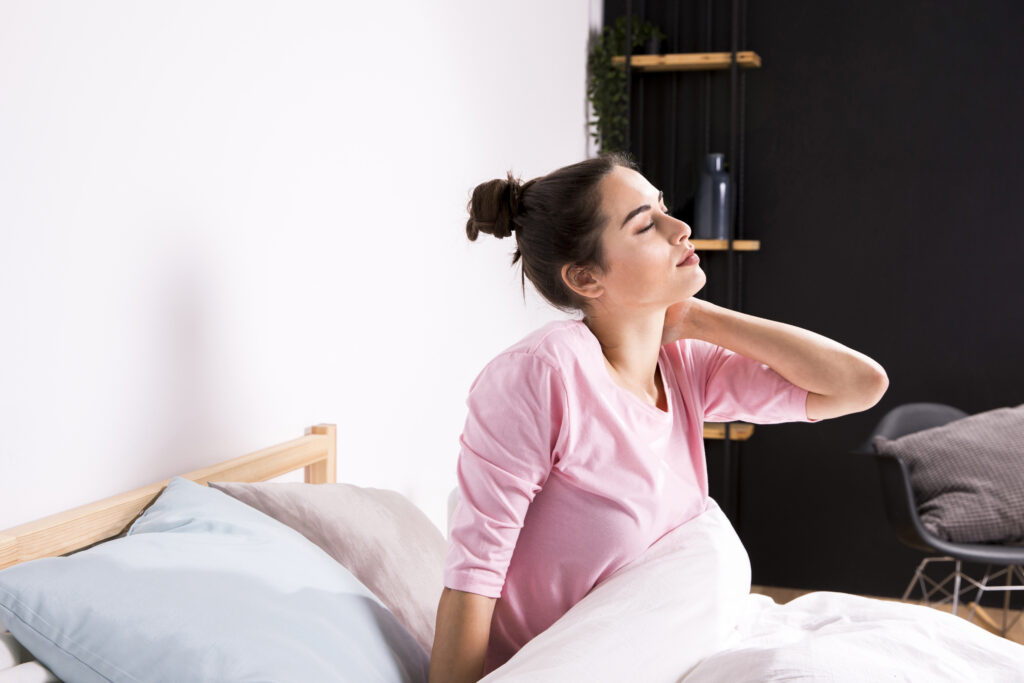When you find yourself struggling with headaches, knowing effective natural relief methods can be invaluable. You might consider essential oils like peppermint, or explore herbal remedies such as ginger and feverfew. Acupressure techniques and deep breathing exercises can also play a significant role in easing discomfort. Each of these approaches offers unique benefits that cater to different types of headaches. Curious about the specific methods that might work best for you? Let's take a closer look at these options and their potential impact on your well-being.
Herbal Remedies
When it comes to finding natural headache relief, herbal remedies can offer effective solutions. You mightn't realize how many options are available right in your kitchen or at your local health store. Herbs like peppermint and ginger are popular for tackling headaches.
Peppermint oil can help soothe tension headaches. Just apply a few drops to your temples and massage it in gently. The cooling sensation can ease discomfort and promote relaxation.
Ginger, on the other hand, can be particularly useful for headaches caused by nausea. Whether you brew ginger tea or chew on raw ginger, it can alleviate both headache and nausea simultaneously.
Another powerful option is feverfew, an herb that has been used for centuries to prevent and treat migraines. You can find feverfew in capsule form or as a tea, making it easy to incorporate into your routine.
If you're looking for something more soothing, consider chamomile. Not only does it help reduce stress, but it also promotes sleep, which is essential for headache recovery. A warm cup of chamomile tea before bed can set the tone for a restful night.
Lastly, don't overlook lavender. The aroma of lavender essential oil can relieve tension and anxiety, both of which can contribute to headaches. You can use it in a diffuser or apply it topically, mixed with a carrier oil.
With these herbal remedies, you can find a natural way to manage your headaches and improve your overall well-being.
Acupressure Techniques
Acupressure techniques can provide effective relief for headaches by targeting specific pressure points throughout the body. By applying pressure to these points, you can help stimulate the body's natural healing processes and reduce pain. You don't need any special equipment; just your fingers or thumbs will do.
One popular pressure point is located between your thumb and index finger, known as LI4 or Hegu. To use this point, firmly press and hold for about 30 seconds while breathing deeply. You'll likely feel a slight ache, which indicates you're on the right track. This technique can help relieve tension headaches and migraines.
Another effective point is located at the base of your skull, known as GB20 or Fengchi. Using your thumbs, apply pressure to the indentations on either side of your spine, just below the skull. Hold for 30 seconds to a minute and focus on relaxing your neck and shoulders. This can alleviate pain stemming from tension and stress.
You can also try the point located on the inside of your wrist, known as P6 or Neiguan. Place three finger widths down from the wrist crease and apply firm pressure. This point has been shown to help reduce nausea and tension, making it useful for headaches that come with these symptoms.
Incorporating acupressure techniques into your routine can be a simple and effective way to manage headaches naturally. Give it a try and see how your body responds.
Essential Oils
Essential oils can be a powerful ally in your quest for headache relief. Many people find that certain scents can ease tension and alleviate pain. You might want to contemplate peppermint oil, which contains menthol that helps relax muscles and improve circulation. Just a few drops applied to your temples or the back of your neck can provide a revitalizing sensation and relieve headache pressure.
Lavender oil is another popular choice. Known for its calming properties, inhaling lavender can reduce stress and promote relaxation, making it effective for tension headaches. Try diffusing it in your space or adding a few drops to a warm bath for a soothing experience.
Eucalyptus oil can also be beneficial, especially if your headache is related to sinus congestion. Its anti-inflammatory properties can help clear nasal passages and ease pressure. Applying diluted eucalyptus oil to your forehead may provide quick relief.
When using essential oils, remember to dilute them with a carrier oil, like coconut or almond oil, to prevent skin irritation. You can also create a personalized blend by mixing a few oils that resonate with you. Experiment to find what works best for your body.
Inhaling these oils through aromatherapy or using them in a massage can further amplify their effects. So, whether you're at home or on the go, essential oils offer a convenient and natural solution to help you combat headaches effectively.
Hydration Strategies
Staying properly hydrated is crucial for preventing and alleviating headaches. Dehydration can lead to various issues, including headaches, so it's important to drink enough fluids throughout the day. Aim for at least eight 8-ounce glasses of water daily, but individual needs may vary depending on factors like activity level, climate, and overall health.
To guarantee you're getting enough hydration, carry a reusable water bottle with you. This makes it easy to sip water anytime you feel thirsty. You can also set reminders on your phone or use hydration apps to track your intake. If plain water doesn't appeal to you, try infusing it with fruits or herbs for added flavor. Slices of lemon, cucumber, or a handful of mint can make your hydration routine more enjoyable.
Additionally, pay attention to foods that contribute to your daily fluid intake. Fruits and vegetables like watermelon, oranges, cucumbers, and celery have high water content and can help keep you hydrated. Herbal teas are another excellent option; they're soothing and can also help with relaxation, making them great for headache relief.
Be mindful of caffeine and alcohol, as they can lead to dehydration if consumed in excess. If you do enjoy these beverages, balance them with extra water.
Finally, listen to your body. If you start to feel a headache coming on, assess your hydration levels and drink a glass of water. Staying hydrated isn't just good for your overall health; it's a simple yet effective strategy for managing headaches.
Relaxation Practices
Finding calm in the chaos of daily life can greatly reduce headache frequency and intensity. By incorporating relaxation practices into your routine, you can effectively manage stress and tension, which are common headache triggers. Start by setting aside a few minutes each day for deep breathing exercises. Inhale slowly through your nose, hold for a moment, and exhale gently through your mouth. This simple technique helps lower your heart rate and promotes relaxation.
Next, consider trying mindfulness meditation. Find a quiet space, sit comfortably, and focus on your breath. Allow thoughts to come and go without judgment. Practicing mindfulness can improve your overall sense of well-being and reduce the likelihood of headaches. Aim for at least 10 minutes of meditation daily.
Yoga is another excellent way to relieve tension. It combines physical movement, breathing exercises, and meditation, all of which can considerably alleviate stress. Whether it's a gentle stretch or a more vigorous flow, yoga fosters a mind-body connection that can diminish headache symptoms.
Progressive muscle relaxation is also beneficial. Tense and then relax different muscle groups in your body, starting from your toes and working your way up to your head. This method can help you identify where you hold stress and teach your body to release it.
Conclusion
Incorporating these natural headache relief methods into your routine can make a big difference in how you manage discomfort. Whether you choose peppermint oil, ginger tea, or acupressure, you'll find options that suit your needs. Staying hydrated and practicing relaxation techniques also play an essential role in preventing headaches. By exploring these remedies, you can take control of your headache relief and enhance your overall well-being. Don't hesitate to try them out and find what works best for you!




